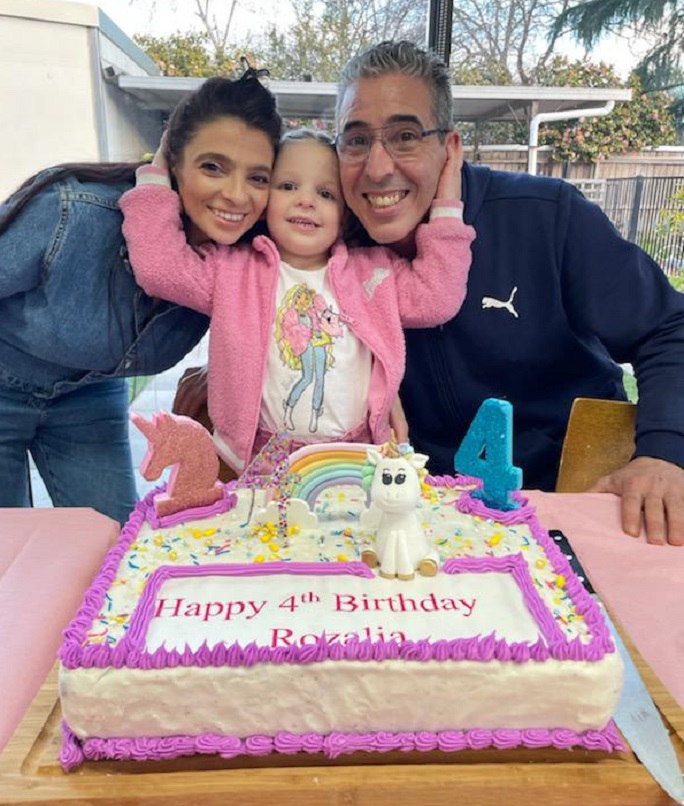
Rozalia Spadafora died at Canberra Hospital on 5 July 2022, the day after her fifth birthday. Photo: Supplied.
Long delays and a lack of effective communication between staff appeared to occur in the lead-up to the tragic death of a five-year-old girl at the Canberra Hospital, an inquest has heard.
Tears were shed by those filling the completely packed courtroom when the coronial inquest for Rozalia Spadafora, who died at the hospital on 5 July 2022, started on Wednesday (25 October).
Her mother, Katrina Spadafora, said she was a girl who loved the Parramatta Eels, selfies and there was not a day that would go by without her daughter saying she was her best friend or telling her that she loved her.
“She was just the ray of sunshine in our lives,” Katrina said.
“She just loved everyone. She was just a spark.
“She would make an effort with everyone, everyone. She was a special little girl.”
Katrina said Rozalia had been “perfectly healthy” and only had minor health issues before 2022.
She had been well before she was taken to see her GP on 28 June with a fever and “sore ears”, but her symptoms resolved with antibiotics.
Then at her birthday party on 3 July, she didn’t have the energy to play with her friends and was pale with puffy eyes and a cough. She was taken to the hospital’s after-hours medical clinic and given medication.
But on 4 July, she was lethargic, quiet and “not herself at all”, Katrina said.
“This was her birthday, her fifth birthday, and she did not have any interest whatsoever,” she said.
She went back to her GP, who recommended she go to hospital. She arrived there at about 7 pm.
Counsel assisting Michael Fordham SC detailed the lengthy chain of events that occurred inside the hospital, some of which appeared to suggest there had been delays, confusion and a lack of communication among the staff.
Rozalia died around 11 pm on 5 July. The evidence suggested she died from a heart condition called myocarditis that was caused by her influenza A infection.
The experts for the inquest had referred to “lost opportunities”, Mr Fordham said. He said their evidence suggested the diagnosis of myocarditis could have been confirmed 2.5 hours earlier than it was, while they also suspected it could have been diagnosed five hours earlier.
The experts went on to suggest that if she had been seen, examined and treated in a timely fashion, it could even have been diagnosed up to 12 hours earlier.

Rozalia Spadafora, pictured with her parents on her fourth birthday, is remembered as a “ray of sunshine”. Photo: Supplied.
The experts thought that if myocarditis had been suggested earlier, then the fluids given to her would have been stopped or moderated and she may have been stable enough to be transported to Sydney for specialised treatment.
He said while the experts could not say if the outcome would have been different, “she may have survived”.
“In essence, whatever chance of survival that was available to Rozalia was lost,” he said.
Mr Fordham said after Rozalia arrived at the hospital, she had not been triaged for about half an hour and was not seen by a doctor for about five hours.
She also didn’t have a blood pressure test until eight hours after triage, the result of which was significantly below normal, and wasn’t diagnosed with influenza until around 7:40 am on 5 July.
Mr Fordham said it was concerning that, on the current evidence, there was “a lack of cooperation and communication” between paediatric and intensive care unit staff and, to a lesser extent, the emergency department team.
Rozalia’s death had a considerable impact on her family, he said, as well as those involved in her care and treatment. He also said the inquest was considering the events in retrospect, knowing what the outcome was.
He said the inquest was not an exercise in blame or vilification, but “difficult questions will be asked and they will have to be answered”.
The court heard changes had occurred at the hospital and Canberra Health Services since her death, including a new digital health record system and a new critical pathology results process, while a new emergency department will open in July 2024.
Coroner Ken Archer described Rozalia as a child of “beauty and energy”, and he was interested in how the healthcare system responded during the incident.
The first stage of the inquest will continue until Tuesday (31 October) in the ACT Coroner’s Court. More hearings will take place in December 2023.



















